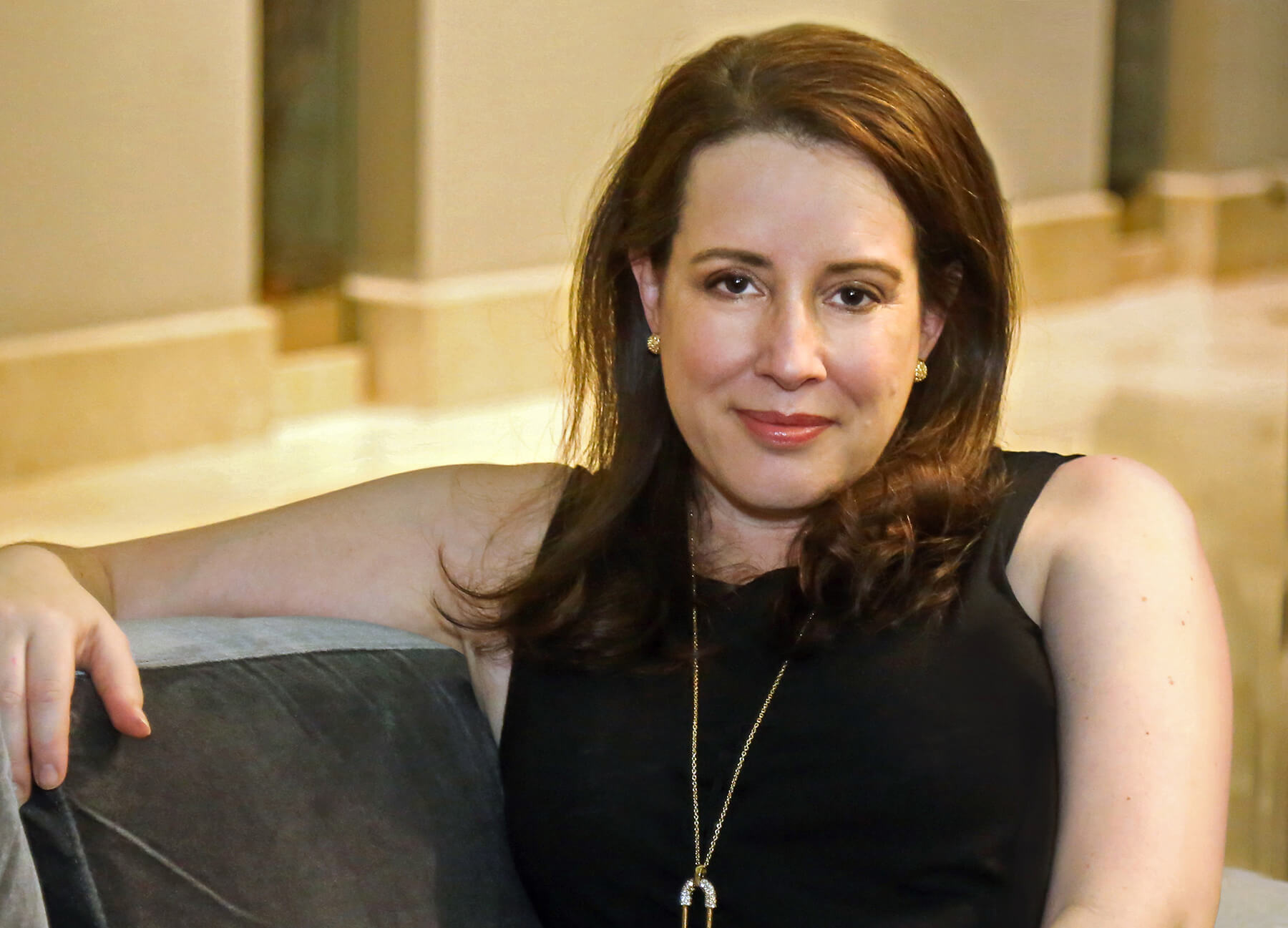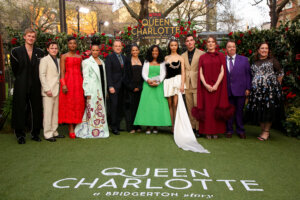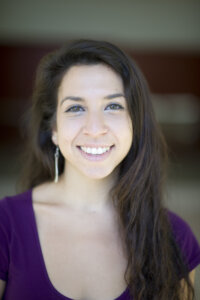‘Bridgerton’ mastermind and ‘Queen Charlotte’ author also makes a mean matzo ball soup

Julia Quinn is still somewhat surprised to see that her books became a Netflix and Shondaland sensation. Photo by Roberto Filho
There’s something about the Bridgerton family that reminds Julia Quinn of her own. Or should we say, the characters she created remind Julie Pottinger (born Cotler) — the author best known by her pen name and the initials JQ — of her animated and affectionate Jewish family.
“I come from a family of very loud, talkative people. Not to stereotype anybody, but we’re pretty typical that way,” Quinn told me in a recent Zoom interview. She’d woken up to wonky internet that day, so she was speaking from her mother’s house five blocks away from her own in Seattle. “Nobody believes me when I tell them I’m the quiet one in the family — because I’m not quiet,” she said. But “it’s very difficult to get a word in edgewise when my family is together.”
The same could be said of the Bridgertons, a boisterous but loving brood rarely at a loss for spirited banter and emphatic opinions. When we meet them in Quinn’s bestselling books — and in the wildly successful Netflix adaptations — the Bridgertons are navigating the marriage mart of Regency-era England as a tightknit clan that consists of eight alphabetically named siblings, their widowed mother, and the memory of their beloved father felled by a bee sting about a decade prior. The context, of course, is a little different. But the family dynamic rings true. And perhaps so does the sense of loss since Quinn’s father and one of her sisters were killed in a car accident in 2021.
By the time Quinn dreamed up the Bridgertons, she’d graduated from Harvard with a degree in art history; applied, deferred, enrolled, and ultimately dropped out of Yale Medical School; and published several successful romance novels.
As best she can remember so many years later, the idea for the Bridgerton books started outside the now-iconic family with the character of Simon, a duke with a cruel father and a severe stutter inspired by the one Quinn encountered in a med school classmate of her husband’s.
“I just remember being fascinated with what it would mean to have that much difficulty communicating,” she said. “Once I came up with Simon, I felt like he needed to find love with the complete opposite of that type of family and so I came up with this very loud, loving, big family which I guess in some ways is a little bit modeled on mine.”
Simon falls in love with Daphne Bridgerton in book one, The Duke and I. But each of the Bridgerton siblings got their own novel — and their own turn at a love story with a happy ending. The Shonda Rhimes treatments of the first two tales in the series were smash hits that charmed tens of millions of viewers, broke Netflix records, and created a cultural moment that launched the romance genre into mainstream consciousness.
As fans eagerly await season three — which will focus on Colin Bridgerton and Penelope Featherington, nicknamed “Polin” — they’re being treated to a spinoff story about her majesty, Queen Charlotte. The six-episode mini-series starring the inimitable Golda Rosheuvel in the title role landed on Netflix on May 4, immediately clinching its spot at No. 1 on Netflix’s most-watched list, and Quinn’s novel of the same name was released five days later.
“I tell people I dream big. But I never dreamed that big,” Quinn said of seeing her characters become a Shondaland sensation. With the royal spinoff, the delight and surprise of it all have only intensified. “It’s not even that you didn’t dare to dream it. It’s like it hadn’t even occurred to you to dream it.”
On the eve of Queen Charlotte’s release in both show and book form, the author behind the Bridgerton empire talked about topics such as Rosheuvel’s phenomenal facial expressions, romance fundamentals, diversity and representation, and matzo balls.
On her Jewish upbringing
“Growing up, we belonged to a temple,” Quinn said. They didn’t attend every week by any means but they did go for the high holidays. “My parents were divorced. I remember going more regularly when my parents were still together,” she added. “Some of my earliest spatial memories are actually of being at temple, darting around during the oneg and trying to get to the cookies.”
On her Jewishness now
“We’re not a terribly religious family, and my husband is not Jewish. So as an adult, it’s been much more of a cultural thing for me than a religious thing. I don’t belong to a temple now. But I do try to celebrate the major holidays. And, you know, I know how to make matzo ball soup.
“My younger sister is much more involved in Jewish life than I am. And she hosts a seder every year,” she added. “It really is, for me, family and culture. I mean, I watch The Marvelous Mrs. Maisel and I feel it. I’m like, I know these people. But I’m not a religious person at all, really.”
On learning Shonda Rhimes wanted to adapt the Bridgerton books
“I was just sitting at Starbucks, as one does, especially when one lives in Seattle. And I got a phone call from my agent,” Quinn said. “And he’s like, ‘Have you heard of Shonda Rhimes?’ And I said, ‘Yes, yes, I have.’ And he said, ‘Well, I just had the most interesting phone call,’ not directly from her, but from her people. ‘They want to know if the rights to the Bridgerton series are still available? And if so, are we interested in talking to them?’” she recalled. To which she responded, “‘I cannot believe you thought you had to call me to ask me that. Hang up on me right now and call them back and say yes, yes, yes.’”

On why she never dreamt it would happen
“I never thought anything I did would be adapted for television or movies or anything like that. Mainly because people just didn’t do that. People did not adapt romance novels,” Quinn said. If they wanted to do something romantic, they’d adapt a Nicholas Sparks novel or write an original rom-com, she explained. “People just would not turn to romance as source material,” she said. “And especially not historical romance. Because if they wanted to do something like that, then they would just do Jane Austen for the 50th time, which immediately makes it prestigious. And don’t get me wrong, I’m here for all of the Austen adaptations. I love them.”
On why romance novels hadn’t been adapted — and why it changed
“I think a big reason is just prestige. People just looked down upon the books,” Quinn said. “They’re written primarily by women, primarily for women, edited primarily by women. And I think as a society, we devalue women’s work and art in a big way,” she explained. “And then also, it’s about feelings. And we devalue things about feelings and emotions.” That all changed, she thinks, “because Shonda is such a visionary,” she said. “And what apparently happened was — she’s a huge reader — she went on vacation, she ran out of books to read, and somehow one of my books was just sitting there. I mean, that’s how lucky I am.”
On the influence of Bridgerton
“The craziest thing was just how big it was. I mean, a book is a very solitary thing. And now there are just hundreds of people involved,” Quinn said. “And then of course, when it came out it became this kind of cultural juggernaut and part of the zeitgeist,” she added. “I have a friend who also writes historical romance, and she said, ‘The best thing you ever did for me is make it easy for me to explain what I do now.’ Because when people ask, ‘What do you write?’ you can say, ‘Oh, like, Bridgerton.’ And everybody instantly knows what it is.”
On her awe for actor Golda Rosheuvel …
Quinn has pointed to Rosheuvel, who plays Queen Charlotte, as a favorite in the first two seasons of Bridgerton on Netflix. “She has such presence. I mean, you’d have to to play a character like that with those wigs and those costumes,” Quinn said. “And if you meet her in real life, too, she has an incredible presence.”
… and Rosheuvel’s facial expressions
“She would make these expressions with her mouth that I can’t possibly do,” said Quinn. “The very last scene — it’s so beautifully filmed. I feel like she should get an Emmy just for that, just her facial expression in the last scene. She’s just brilliant.”
On writing a reverse adaptation for Queen Charlotte
“I really had to change the architecture,” she said. “The scripts are written — they’re not in anybody’s point of view. They’re lots of short scenes. So I had to break it all down, and then figure out how to rebuild it and flesh it out as a novel.”
On how the spinoff helps viewers reexamine characters they know
“We’re all curious what goes on behind closed doors,” Quinn said. “You don’t know what anybody’s going through in their private life. Here’s the Queen, who people think has it all — she has the power, she has the money, she has this, she has that. Well, she also has this incredibly bittersweet marriage, and by that time it’s far more bitter than sweet,” she said. The spinoff might help people “understand that she’s a much more complex character than she might seem on the surface and maybe realize that everybody’s more complex than they seem on the surface.”
On happy endings in the romance genre and why we need them
“Nobody knew we were gonna have a global pandemic, but it’s a show that celebrates the human connection at a time when we were starved for it. So it really filled the need,” Quinn said. But beyond the pandemic, “for so long, media has not elevated happiness as a goal.” It’s true that Bridgerton celebrates happiness — through romantic love but also family and friendship — “within this very rarefied world where everybody’s really good looking and they have gorgeous clothes and all the money they need. So yes, we’re not saying it’s realistic in that way. But I think people really relate to it,” Quinn said. “You get to see all the things that you want out of life, but in this beautiful, gorgeous, colorful, fairytale setting.”
On what the diverse casting of the Netflix series helped her realize
“It definitely helped me see differently. I come from a family of Eastern European Jewish immigrants. We were not dukes and duchesses. I mean, not even close. If we’d been there, we would have been the peasants or the watchmakers or something,” Quinn said. Still, “I can always see myself in the story. Because watching all these Jane Austen adaptations, everybody looked kinda like me, right? But honestly, for many, many years, it didn’t necessarily occur to me that not everybody had that.”
Quinn remembers encountering Jewish characters in books as a young reader and thinking they were like her. “I can remember that feeling, that connection,” Quinn said, pointing to Judy Blume characters like Margaret Simon in Are You There, God? It’s Me, Margaret and the titular protagonist of Starring Sally J. Freedman as Herself. “I felt seen,” she said. “But even with that, it takes time to really realize how much other people aren’t being seen.”
On writing more diverse characters into her work
“Am I the person necessarily to write that in all the books? I don’t know,” Quinn said. “I realize that kind of contradicts the whole Queen Charlotte thing, but I do have Shonda as my co-writer. Would I have done this project without her? I don’t know, honestly,” she admits.
“What I’ve really been trying to do with whatever public place I hold is to promote Own Voices,” Quinn said. “And to really try to seek out romances written by women of color or other people in marginalized groups and try to get them into the public eye — which I think is even more important than anything I can do within my own books.”
On what she hopes readers and viewers see in Queen Charlotte
“I feel like so much about Queen Charlotte is about women finding their agency and power,” Quinn said. “I mean, the romance, don’t get me wrong, that’s a wonderful thing that I am excited to see,” she added. But “I think people will love learning more about these characters who they already know and love as older women and seeing a little bit about how they got there” — including Queen Charlotte herself as well as Lady Danbury and Violet Bridgerton.
On whether there are any Jewish characters in store in future books
“It’s something that I haven’t done in a big way. Because one, I’ve been writing the Regency time period, and in terms of being the aristocracy, there weren’t many,” Quinn said. “And also, just being very aware of the rampant antisemitism, trying to figure out how do you bring this in and honor them without sanitizing history,” she added. “But I’m thinking about it.” In the meantime, she recommends the work of author Felicia Grossman. “She’s a wonderful writer and so I’m eager to dig into more of her work and see how she’s doing it,” Quinn said.
And finally, on the best and quickest matzo ball soup …
“I already bragged about my matzo ball soup,” Quinn said as our conversation drew to a close and I asked her if there was anything else she wanted to add. “The key to the matzo balls is to buy the Manischewitz matzo ball mix — not the matzo meal — and just follow the instructions exactly. Because the first time I did it, I was like, ‘Why am I boiling these in water first? Why can’t I just cook them in the soup? Doesn’t work,” she explained. She had to curb her tendency to futz and improvise. “Follow it exactly and they’ll turn out great,” she said. “And then the other thing that I do too is make the soup. But the best way to make the soup is to go over to my mom’s freezer and take out her frozen soup.”

I hope you appreciated this article. Before you go, I’d like to ask you to please support the Forward’s award-winning journalism this Passover.
In this age of misinformation, our work is needed like never before. We report on the news that matters most to American Jews, driven by truth, not ideology.
At a time when newsrooms are closing or cutting back, the Forward has removed its paywall. That means for the first time in our 126-year history, Forward journalism is free to everyone, everywhere. With an ongoing war, rising antisemitism, and a flood of disinformation that may affect the upcoming election, we believe that free and open access to Jewish journalism is imperative.
Readers like you make it all possible. Right now, we’re in the middle of our Passover Pledge Drive and we need 500 people to step up and make a gift to sustain our trustworthy, independent journalism.
Make a gift of any size and become a Forward member today. You’ll support our mission to tell the American Jewish story fully and fairly.
— Rachel Fishman Feddersen, Publisher and CEO
Join our mission to tell the Jewish story fully and fairly.
Our Goal: 500 gifts during our Passover Pledge Drive!

























